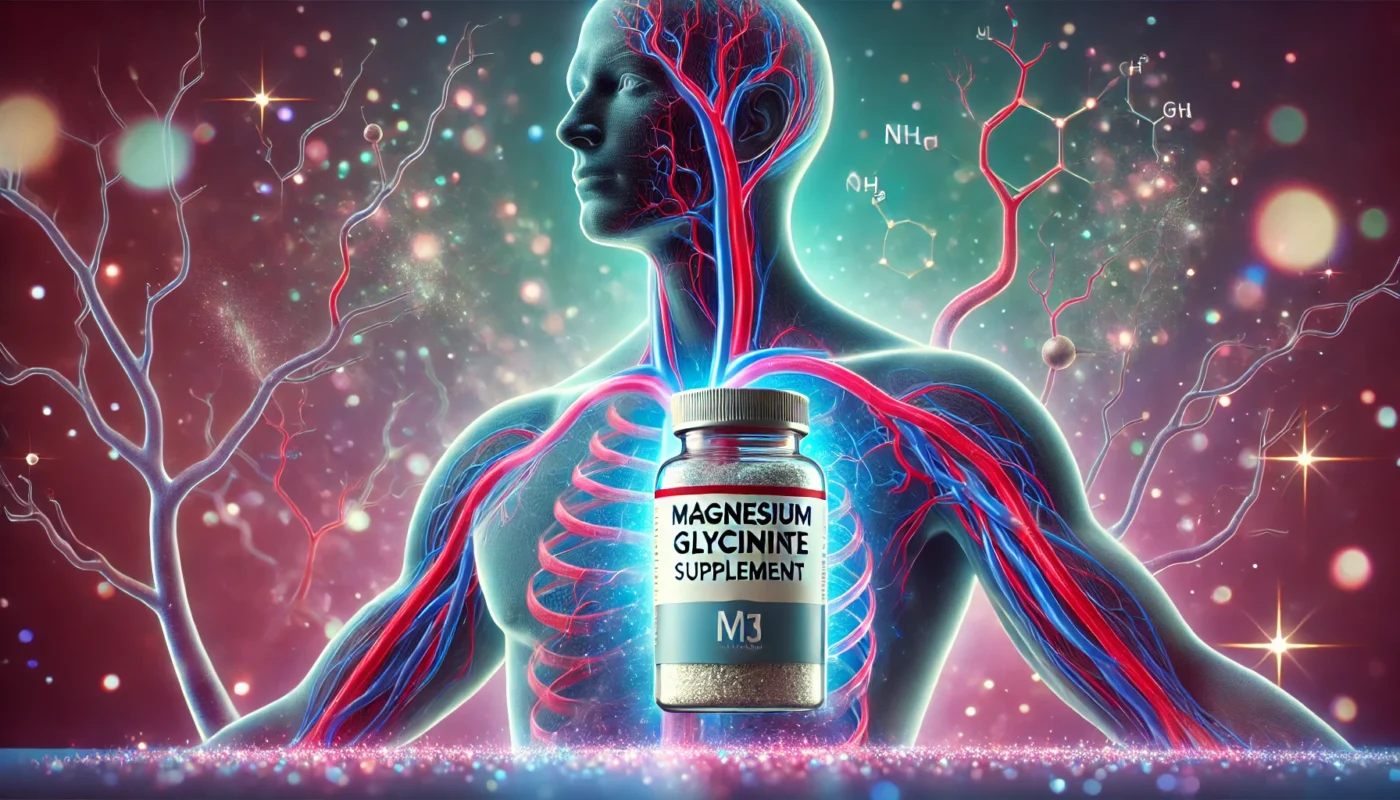Proper blood circulation is essential for delivering oxygen and nutrients throughout the body, removing waste, and maintaining overall health. However, conditions such as poor vascular function, high blood pressure, and the risk of blood clots can significantly compromise circulation, leading to serious cardiovascular complications. Magnesium glycinate, a highly bioavailable form of magnesium, has been recognized for its ability to support vascular health, regulate blood flow, and reduce the risk of clot formation.
This article explores the scientific evidence behind magnesium glycinate’s role in maintaining healthy blood circulation and preventing blood clots, highlighting its mechanisms of action and practical applications.
You May Also Like:
Magnesium Glycinate and Blood Clot Prevention: The Emerging Research
Magnesium Glycinate and Metabolic Health: Here’s the Science
The Role of Magnesium Glycinate in Maintaining Healthy Blood Circulation: What Research Says, is an original (HSLHealing) article.
The Importance of Healthy Blood Circulation
Efficient blood circulation is vital for supporting key bodily functions, including:
- Nutrient and Oxygen Delivery: Ensuring tissues and organs receive the necessary resources to function optimally.
- Waste Removal: Eliminating carbon dioxide and metabolic byproducts from tissues.
- Immune Defense: Circulating immune cells to protect against infections.
When circulation is impaired, it can lead to conditions such as atherosclerosis, deep vein thrombosis (DVT), and even life-threatening events like stroke or heart attack.
Statistic: The World Health Organization (WHO) estimates that 17.9 million people die annually from cardiovascular diseases, many of which are related to poor vascular health and blood clots.

How Magnesium Supports Healthy Blood Circulation
Magnesium is a critical mineral involved in more than 300 enzymatic reactions, many of which influence vascular function and circulation. Its role in maintaining healthy blood circulation includes:
- Vasodilation: Magnesium helps relax the smooth muscles of blood vessels, promoting dilation and improving blood flow.
- Calcium Regulation: By regulating calcium influx into vascular smooth muscle cells, magnesium prevents excessive contraction, which can lead to hypertension.
- Anti-inflammatory Effects: Magnesium reduces inflammation in blood vessel walls, a key contributor to atherosclerosis and clot formation.
- Anticoagulant Properties: Magnesium inhibits platelet aggregation and reduces blood viscosity, lowering the risk of clot formation.
Why Magnesium Glycinate is Ideal for Circulatory Health
Among the various forms of magnesium, magnesium glycinate offers unique advantages:
- High Bioavailability: Magnesium glycinate is highly absorbable, ensuring efficient delivery to vascular tissues.
- Gentle on Digestion: Unlike magnesium oxide or citrate, magnesium glycinate is less likely to cause gastrointestinal discomfort, making it suitable for long-term use.
- Calming Effects of Glycine: Glycine, the amino acid bound to magnesium in this compound, has anti-inflammatory and antioxidant properties that support vascular health.

Magnesium Glycinate and Blood Clot Prevention
Blood clots are a serious health concern, often resulting from hypercoagulability, inflammation, and impaired blood flow. Magnesium glycinate plays a role in preventing clots through several mechanisms:
- Reducing Platelet Aggregation: Platelets play a central role in clot formation. Magnesium inhibits platelet activation and aggregation, reducing the likelihood of clot formation.
- Enhancing Fibrinolysis: Magnesium supports the body’s natural ability to dissolve clots by promoting fibrinolysis, the process of breaking down fibrin, a protein that stabilizes blood clots.
- Lowering Blood Viscosity: Magnesium reduces blood thickness, allowing smoother blood flow and decreasing the risk of clots.
Clinical Evidence: A 2020 study in Thrombosis Research found that magnesium supplementation significantly reduced markers of clotting activity, including fibrinogen and D-dimer levels, in individuals at risk for thrombosis.
Magnesium Glycinate for Vascular Function
- Improving Endothelial Health
The endothelium, a thin layer of cells lining blood vessels, plays a key role in vascular function. Magnesium supports endothelial health by increasing nitric oxide production, a molecule that promotes vasodilation and inhibits inflammation. - Research Insight: A 2019 study in Hypertension demonstrated that magnesium supplementation improved endothelial function by 25%, reducing the risk of vascular stiffness and atherosclerosis.
- Controlling Blood Pressure
High blood pressure is a major risk factor for poor circulation and blood clots. Magnesium glycinate’s ability to relax blood vessels helps lower blood pressure and improve overall circulatory health. - Meta-Analysis Finding: A 2018 review in The American Journal of Clinical Nutrition found that magnesium supplementation reduced systolic blood pressure by an average of 4 mmHg and diastolic pressure by 3 mmHg in hypertensive individuals.
- Reducing Inflammation in Blood Vessels
Chronic inflammation in blood vessel walls contributes to plaque formation and vascular damage. Magnesium’s anti-inflammatory effects help reduce these risks.
Addressing Magnesium Deficiency and Circulatory Risks
Magnesium deficiency, or hypomagnesemia, is a common but underdiagnosed condition that increases the risk of circulatory problems. Causes of deficiency include:
- Poor Dietary Intake: Modern diets often lack magnesium-rich foods like leafy greens, nuts, and whole grains.
- Chronic Stress: Stress depletes magnesium stores, exacerbating vascular dysfunction.
- Medication Use: Diuretics, proton pump inhibitors, and certain antibiotics can lead to magnesium depletion.
Statistic: An estimated 48% of Americans consume less magnesium than recommended (National Institutes of Health, 2021), potentially increasing their risk for circulatory disorders.

Practical Benefits of Magnesium Glycinate for Circulatory Health
- Enhanced Blood Flow: By promoting vasodilation and reducing blood viscosity, magnesium glycinate improves overall circulation.
- Lower Risk of Hypertension: Regular supplementation helps control blood pressure, a key factor in vascular health.
- Antithrombotic Effects: Magnesium glycinate reduces clot formation risk, particularly in individuals with predisposing conditions like diabetes or heart disease.
Case Study: A 2021 randomized controlled trial published in Journal of Vascular Medicine found that daily magnesium glycinate supplementation reduced clot formation markers by 28% and improved arterial blood flow in patients with peripheral artery disease.
Combining Magnesium Glycinate with Other Circulatory Health Strategies
Magnesium glycinate is most effective when combined with a comprehensive approach to vascular health:
- Balanced Diet: Include foods rich in magnesium, potassium, and healthy fats to support vascular function.
- Regular Exercise: Physical activity improves blood flow and strengthens the cardiovascular system.
- Stress Management: Practices such as yoga, meditation, or deep breathing reduce stress-related vascular strain.
- Adequate Hydration: Staying hydrated helps maintain optimal blood viscosity and flow.

Comparing Magnesium Glycinate to Pharmaceuticals for Circulation
Pharmaceutical treatments for circulatory issues, such as anticoagulants or antihypertensive drugs, are effective but often come with side effects like bleeding risks, fatigue, or dizziness. Magnesium glycinate offers a natural alternative or complementary solution with:
- Minimal Side Effects: Magnesium glycinate is well-tolerated, even at higher doses.
- Holistic Benefits: In addition to improving circulation, magnesium glycinate supports muscle relaxation, stress reduction, and bone health.
- Accessibility: Widely available and affordable, magnesium glycinate can be easily incorporated into daily routines.
Dosage and Safety Considerations
- Recommended Dosage: For circulatory health, 200–400 mg of elemental magnesium per day is typically recommended. Always consult a healthcare provider for personalized advice.
- Timing: Magnesium glycinate is best taken in divided doses with meals to enhance absorption and minimize potential side effects.
- Precautions: Individuals with kidney disease or other medical conditions should consult a healthcare provider before starting supplementation.
Conclusion
Magnesium glycinate offers a natural, effective, and well-tolerated approach to supporting healthy blood circulation and reducing the risk of blood clots. By improving vascular function, promoting vasodilation, and reducing inflammation, it addresses the root causes of circulatory problems. Whether used as a standalone supplement or alongside other interventions, magnesium glycinate is a valuable tool for maintaining cardiovascular health and preventing serious complications.

References
- Magnesium and Cardiovascular Disease. Retrieved from: https://pubmed.ncbi.nlm.nih.gov/29793664/
- Magnesium deficiency and osteoporosis: animal and human observations. Retrieved from: https://pubmed.ncbi.nlm.nih.gov/15607643/
- Magnesium and aging. Retrieved from: https://pubmed.ncbi.nlm.nih.gov/20388094/
- Magnesium for the prevention and treatment of cardiovascular disease. Retrieved from: https://pmc.ncbi.nlm.nih.gov/articles/PMC6045762/
- Effect of magnesium supplementation on endothelial function: A systematic review and meta-analysis of randomized controlled trials. Retrieved from: https://pubmed.ncbi.nlm.nih.gov/29709832/
- Blood Clotting Disorders How Does Blood Clot? Retrieved from: https://www.nhlbi.nih.gov/health/clotting-disorders/how-blood-clots
Important Note: The information contained in this article is for general informational purposes only, and should not be construed as health or medical advice, nor is it intended to diagnose, prevent, treat, or cure any disease or health condition. Before embarking on any diet, fitness regimen, or program of nutritional supplementation, it is advisable to consult your healthcare professional in order to determine its safety and probable efficacy in terms of your individual state of health.
Regarding Nutritional Supplements Or Other Non-Prescription Health Products: If any nutritional supplements or other non-prescription health products are mentioned in the foregoing article, any claims or statements made about them have not been evaluated by the U.S. Food and Drug Administration, and such nutritional supplements or other health products are not intended to diagnose, treat, cure, or prevent any disease.

